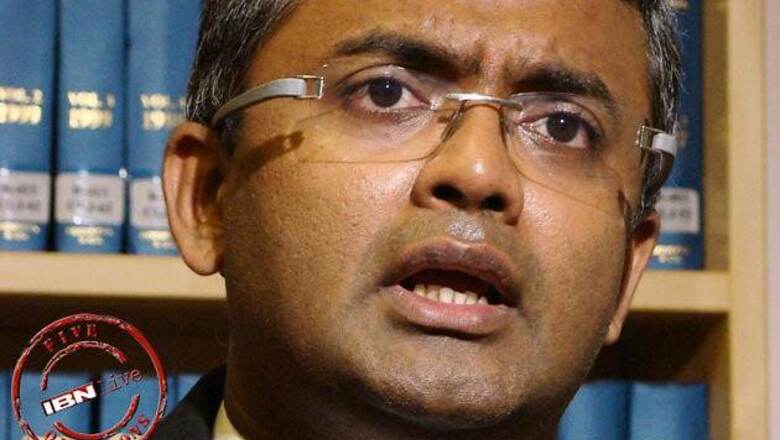
views
In the second of the series, Five Questions - we pose five questions on the legal aspects of the recent controversy over the Indian government's attempts at censoring content on the Internet to lawyer Sajan Poovayya.
Poovayya is the managing partner at Poovayya & Co, a full-service law firm based in Bangalore and his areas of expertise include IT, Internet regulation and telecommunication.
1. Is India trying to emulate China or can India go the China way in censoring the Internet? Are such efforts congruent with the right to free speech as enshrined in the Constitution of India?
Sajan Poovayya: Primacy of the rule of law and affording equal protection of the laws are very strongly enshrined in Indian Constitutional jurisprudence. As a Constitutional and Technology Lawyer, it is clear to my mind that the executive in India is not only attempting to emulate China but really wanting to go beyond in curbing free speech on the Internet. It would be unfair to blame the governance in India as a whole. It is only the executive i.e., the Central Government in India which is on a hegemonistic path, in its attempt to govern the Internet. On the contrary, the judiciary in India has consistently protected free speech and the freedom of expression and continues to do so, even as regards matters relating to the Internet and the electronic domain.
At the least, China was straight forward in its attempt to curb Internet independence. The Indian executive, whilst publicly posturing towards the rule of law, is indirectly attempting to use the very same law to impose its supremacy on the Internet. Clearly, such efforts are contrarian to the Constitutional protections enshrined to every citizen.
The actions of the executive, to my mind, demonstrate either a very poor understanding of technology and the manner in which the Internet operates or the deliberate attempt to reign supremacy, despite clear knowledge on the method of governance possible on the Internet. The recent activities clearly indicate a strong leaning towards censorship of the Internet.
As a Constitutionalist, I cannot agree more with the executive that impermissible content such as child pornography, obscenity, hate speech, religious insults etc., should not be available on the Internet. There are methods by which this can be curbed and it is important for the executive to apply that methodology. Unfortunately, the latest series of attempts by the executive to ostensibly cleanse the Internet does not seem to emanate from its concern against child pornography or related matters of importance. It seems instead to emanate from the factum of very sharp criticism against political leaders being available on the Internet, post the Anna Hazare movement, which the political class is unable to tolerate. Thus, it can be seen as an attempt to elevate politicians into a class unto themselves and deprive citizen the Constitutionally enshrined right to criticize. To camouflage such attempts by denoting a facade of a fight against pornography, religious intolerance etc., is regrettable. If defamatory content against the political class is available on the net, recourse to judicial proceedings is the right methodology. No one other than the courts of our country, have the authority to declare a particular content as defamatory. By requiring proactive monitoring of defamatory content, the executive is clearly transgressing into the judicial domain.
2. Can the Indian government force foreign companies, such as Twitter, that do not have an official presence in India to follow its diktats?
Sajan Poovayya: An Internet service provider, offering services in India, should necessarily comply with the law of the land. It would be impermissible for a service provider to argue that compliance with the law of the land is unnecessary, despite its services being targeted at India, merely on the ground that it does not have an official or incorporated presence in the country. India can and should apply its laws on Internet service providers, in a non-arbitrary and non-discriminatory manner, irrespective of whether such service providers have an official presence in the country. I don't think it is anybody's case that services will be offered in the country, without compliance with the laws of the land.
I am clearly of the view that if services are targeted at India, Indian regulations should be applied, whether or not the user and/or the service provider resides in India. As far as I am aware, most pre-eminent Internet service providers apply this yardstick and comply with Indian laws. The dispute arises when the Indian executive attempts to impose mandates of 'proactive monitoring' and 'pre-censorship' on content available on the Internet. This is not permissible under the law, as it applies today, in our country.
3. Is there any provision in India's IT laws that supports the pre-screening of content as suggested by Union IT Minister Kapil Sibal?
Sajan Poovayya: Certainly not. Mr. Sibal has been one of India's leading lawyers before venturing into public life. I am certain that on a bare perusal of the Information Technology Act and the Information Technology (Intermediaries Guidelines) Rules, he will agree that the law of the land does not either mandate or support pre-screening of content available on the Internet. At any event, the law does not impose the obligation of pre-screening or proactive monitoring of content available on the Internet, on the Internet intermediary i.e., the service providers who offer search engines, web hosting services etc. India's information technology laws have been progressively updated post 2008 and are fairly harmonious with the mandates that apply in most mature legal jurisdictions around the world. It is the interpretation being afforded by the executive, in the process of policy implementation, that is regressive. Fortunately, India has one of the finest judiciaries in modern democracies of the world and we can therefore certainly hope that policy control by the judiciary will be effective.
Expecting a service provider to proactively monitor content or pre-screen content, would be contrary to the law. Section 79 is clear that the protections and safeguards afforded therein, will be available to a service provider, if and only if the service provider does not monitor and choose the third party user generated content, that will be uploaded. In other words, if you begin to screen and choose content that would be uploaded on your platform, you cease to enjoy the protection from liability afforded under Section 79. Clearly, the executive cannot expect an Internet intermediary to conduct itself in a manner that the protection of the law is lost.
4. According to Indian laws what are the responsibilities and liabilities of intermediaries, such as social networking services, on content posted by users?
Sajan Poovayya: Indian law clearly provides threshold protection and safe harbours to Internet intermediaries. Search engines, web hosting service providers, content sharing service providers etc., who clearly fall within the definition of an Internet intermediary under the Information Technology Act, do not have the responsibility to proactively monitor third party content available on the Internet. A conjoint reading of Section 79 of the IT Act, as amended in 2009, and the Information Technology (Intermediaries Guidelines) Rules, 2011, clearly denotes that an Internet intermediary is not obligated to undertake a pre-screening exercise or proactively monitor third party user generated content, available on its platform.
Search engines merely index information available on the net. In a manner of speaking, a search engine's findings are only reflective of what is available on the net and the law clearly does not impose any liability on a search engine, for the availability of illegal third party content on the net. Even in the case of web hosting services, the law does not impose upon the service provider, the obligation of proactively monitoring third party user generated content available on its platform. There is a threshold protection from liability afforded to such intermediaries, under Section 79. Such protection is not unusual to India and is provided by every mature legal jurisdiction in the world. It is only upon being notified of illegal content being available on its platform, the service provider is expected to review such content and take such content down, if found to be in violation of the laws.
Expecting a service provider to proactively monitor content or pre-screen content, is contrary to the law. Section 79 is clear that the protections and safeguards afforded therein, will be available to a service provider, if and only if the service provider does not monitor and choose the third party user generated content, that will be uploaded. In other words, if you begin to screen and choose content that would be uploaded on your platform, you cease to enjoy the protection from liability afforded under Section 79.
5. Many European countries have stringent laws to protect online user privacy. Is there any such provision in the Indian law?
Sajan Poovayya: The thresholds imposed by the Communications Decency Act in the United States or by similar legislations in Europe, are fairly onerous but not unacceptable, from a perspective of the developments in technology and growth of the Internet. To my mind, on a comparative analysis, Indian law does not impose stringent regulations that are contrarian to global standards. The laws applicable to Internet intermediaries in India are fairly harmonious with those applicable in other mature legal jurisdictions. As I had indicated earlier, the policy formulation is fairly adequate. It is the policy implementation that is regressive. Unfortunately, the executive has consistently failed to understand the developments in technology, growth of the Internet, and the sheer impossibility of complying with what the executive believes is the threshold. Such actions not only transgress the Constitutional guarantee of free speech but can also potentially lead to a deceleration of growth in e-commerce and web enabled services space. Rather than being a facilitator for economic growth, the government has begun to act as a moral regulator, with little thought to growth and development.




















Comments
0 comment